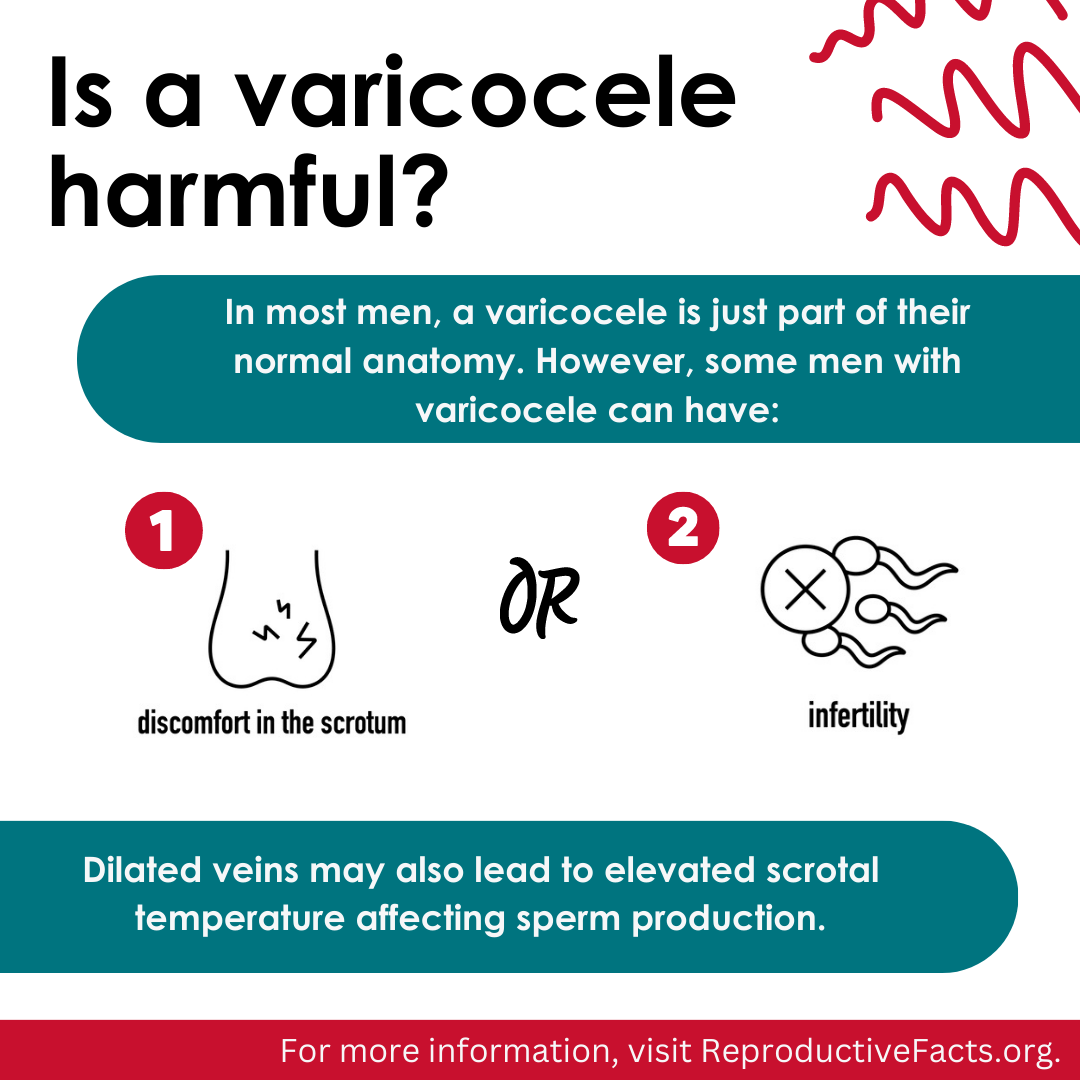
Varicocele
Download a PDF of this document:
English version
Spanish version
Chinese version
Revised 2023
What is a varicocele?
A varicocele is enlargement of the veins in the scrotum (the sac that holds the testicles). Varicoceles usually develop at puberty and persist throughout life unless they are treated. Varicoceles are common on the left side but can occur on either or both sides.What causes varicocele?
The exact cause of a varicocele remains unknown, although many theories have been proposed. Varicoceles are a variation of normal anatomy that doesn’t become apparent until puberty when the testicles grow and blood flow increases.
How common is it?
Varicoceles are common, occurring in about 20-25% of adult men.
How is a varicocele detected?
A varicocele is diagnosed by physical exam and most easily visualized while standing. It usually is less prominent when lying down. An ultrasound is not required to diagnose a varicocele but may help with the diagnosis in some men. A varicocele that is shown on ultrasound but cannot be felt on physical exam is called a subclinical varicocele.
Is varicocele harmful?
In most men, a varicocele is an anatomical finding that will not cause any symptoms or problems. However, a varicocele can lead to reduced fertility or scrotal pain in some men. Less than half of men with a varicocele have a reduced sperm count and/or quality, which can affect their ability to get pregnant. Varicoceles do not cause any other health problems.
How can a varicocele cause infertility?
There are several theories how varicoceles may affect male fertility. The most popular is that varicoceles elevate the temperature of the scrotum due to dilated veins and pooling of blood. The increased temperature interferes with normal sperm production and activity.When should a varicocele be treated?
Treatment for a varicocele should be considered when men have associated pain or infertility with an abnormal semen analysis. Men with a normal semen analysis do not need to have their varicocele treated. A subclinical varicocele does not require treatment.How is a varicocele treated?
Surgery is the most common treatment for a varicocele. A small incision is made in the groin, and the spermatic cord containing the enlarged vessels is examined. The dilated veins are tied off to prevent blood from pooling while the arteries and other structures (for example the vas deferens) are left alone. This surgery is done as an outpatient procedure under either general or local anesthesia.Two thirds of men will see improvement in their semen analyses and about 40% can achieve a pregnancy after surgical treatment for a varicocele. An alternative to surgery is embolization, performed by a radiologist. During embolization, the radiologist uses a catheter to place a coil or fluid in the vein to block blood flow and subsequent blood pooling.
What are the risks of varicocele surgery?
Serious complications are rare. Risks include bleeding, infection, injury to the testicle, and the risks of general anesthesia. About 1% of men who have varicocele surgery will have a recurrence or persistence of a varicocele after surgery.



Male Fertility/Andrology
Fact Sheets/Booklets
View more fact sheets and booklets written by the ASRM Patient Education Committee.
Hormonal Contraception
Hormonal contraceptives contain a progestin (progesterone medicine) with or without an estrogen.
Embryo Donation: What Should I Know?
In the current practice of in vitro fertilization (IVF), some patients may create more embryos (fertilized eggs) than they need. The extra embryos may be cryopreserved (frozen) so that they can be transferred later.
Hypothyroidism and pregnancy: what should I know?
Hypothyroidism (underactive thyroid) is when the thyroid gland produces less thyroid hormone than it should.
Infertility Counseling and Support: When and Where to Find It
Infertility is a medical condition that touches all aspects of your life.Find a Health Professional
Connect with reproductive medicine experts who will guide you through your unique journey. Our search tool allows personalized matches based on location, specialization, and expertise. Take control of your reproductive health with compassionate providers, innovative treatments, and unwavering support.
Search for an Expert











